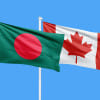Danger comes with restriction
Freedom of expression and a vibrant strong democracy go hand in hand. A free press contributes to a stronger society and country. One of the most important roles of the media, that of the watchdog, can only be ensured if it is free. Free speech is the most important tool for self-governance in a modern democratic society. The countries that have greater freedom of press tend to have strong democratic governance and less corruption.
This has been once again proven in the two latest international indexes on press freedom and corruption released by Reporters Without Borders (RWB) and Transparency International (TI).
Denmark, Finland, New Zealand, Netherlands and Norway scored high in the world press freedom index released by RWB last month. Like previous years, these are the five top ranking countries in a list of 180 nations with greater press freedom.
Freedom of the press, according to political scientists and economists, is a primary contributor to good governance and this has also been proven in numerous political and economic studies.
The five countries that have greater press freedom are significantly benefited by good governance and greater rein on corruption in their administrations. The governments protect freedom of the press there and in return they can ensure the good governance its citizens deserve and demand.
Like previous years, these countries have scored big and become five least corrupt countries in the world in TI's latest corruption index released last January.
The poor state of freedom of press is always symptomatic of bad governance and fragile democracy in a country. Culture of secrecy always breeds rampant corruption in many levels of the statehood and its administration.
In the press freedom index, Somalia, North Korea, Afghanistan, Sudan and South Sudan scored poor. Somalia ranked 167, North Korea 179, Afghanistan 120, Sudan 174 and South Sudan ranked 140.
Predictably, it does not show any positive results for them. They have been labelled the five most corrupt countries in the world in the TI's index. People of these countries also suffer immensely due to the poor governance and corruption.
Former World Bank president James Wolfensohn often identified government corruption as the primary hindrance to development and an independent media sector as the number one tool to fight public corruption.
The situation in Bangladesh is not comfortable in any of the indexes. It ranked 144 in world press freedom index and 139 in TI index. The rankings tell of the poor state of governance and freedom of the press.
The RWB says, in Bangladesh, it is a bad idea to criticize the constitution or Islam, and the state religion. Journalists and bloggers who refuse to submit to censorship or to censor themselves on these subjects risk life imprisonment or the death penalty, it said in its latest index.
"Outspoken secularists are also targeted by Islamist militants. The media are nonetheless quite diverse and fairly outspoken on less sensitive issues," said the watchdog, a France-based international non-profit, non-governmental organization.
The RWB promotes and defends freedom of information and freedom of the press. It has consultant status at the United Nations.
With high hopes for changes, World Press Freedom Day is being observed in Bangladesh today and elsewhere in the world at a time when press freedom is under tremendous pressure.
IMPORTANCE OF PRESS FREEDOM
Article 19 of the Universal Declaration of Human Rights unequivocally states that everyone has the right to freedom of opinion and expression; this right includes freedom to hold opinions without interference and to seek, receive and impart information and ideas through any media and regardless of frontiers.
It is said that journalists are among the greatest users of the right. But press freedom is not limited to the news media only.
"It is the freedom for any person to use their right to free expression to impart content, including creative content, to a wider public, by means of mass communication platform that encompass social media, for example," says a concept note of the UNESCO on this year's World Press Freedom Day.
"In this sense, each individual has a direct stake in press freedom."
Considering the importance of the freedom of the press, the UN declared May 3 as World Press Freedom Day in 1993 to promote freedom of the press and the day has been observed since then under the support of UNESCO.
On the eve of the day, the UN says ensuring freedom for the media around the world is a priority. Independent, free and pluralistic media are central to good governance in democracies that are young and old.
"Free media can ensure transparency, accountability and the rule of law; promote participation in public and political discourse, and contribute to the fight against poverty," says the world body in a message posted on its website.
It also states that an independent media sector draws its power from the community it serves and in return empowers that community to be a full partner in the democratic process.
FREEDOM OF PRESS FOR SDG
The overarching theme of this year's observance is access to information and fundamental freedoms with a focus on: freedom of information and sustainable development, protecting press freedom from censorship and surveillance overreach and ensuring safety of journalists online and offline.
The link between press freedom and sustainable development is made for the first time this year, following the adoption in late 2015 of the United Nation's Sustainable Development Goals (SDGs) for 2030, says UNESCO in a message posted on its website. The SDG " recognize the need to 'ensure public access to information and protect fundamental freedoms, in accordance with national legislation and international agreements.' ”
The importance of free and independent media to inform the citizens of the world is crucial to the achievement of the SDGs, argues the Director-General of UNESCO, Irina Bokova, in her message for the Day.
“At this time of turbulence and change across the world, including new challenges that require global cooperation and action, the need for quality information has never been so important—this requires a strong environment of press freedom and well-functioning systems to ensure the people's right to know,” states Irina.
Press freedom and access to information, according to the UNESCO concept note, are essential to democracy and to sustainable development.
BANGLADESH PERSPECTIVE
Perhaps, Bangladesh is the lone country that should remain specially grateful than others to the spirit of free press for its birth.
A group of journalists staying in Dhaka on the night of March 25-26, 1971 broke the news of genocide carried out by the Pakistani occupation army to the world.
They had to face enormous difficulties and even risked their lives as they were forced to leave Dhaka at gunpoint by the Pakistan army.
US journalists kept reporting on the genocide informing the world as well as citizens of the USA. The US journalists also exposed the then US administration's support for Pakistan.
Through their reports, US citizens learnt of the military brutality in East Pakistan, and they protested the US strategy to support Pakistani military rulers and organised in support of the Bangalis.
Due to the role of the press, a strong public opinion was built across the world in favour of the Liberation War of Bangladesh.
The framers of the Bangladesh constitution recognised the importance of the free press by guaranteeing freedom of the press in the constitution.
Bangladesh suffered terribly in the absence of a free press immediately after the brutal assassination of Bangabandhu Sheikh Mujibur Rahman and almost all of his family members on August 15, 1975.
The army as an institution was in no way involved in the assassination. But the killers of August 15 usurped the name of the entire armed forces to defend their heinous actions by launching pre-planned propaganda through state-run media--radio, television and newspapers. [At that time there was no free media except the nationalized ones.]
The media played a significant role in the ouster of the autocratic ruler HM Ershad and restoration of democracy and later, in ensuring people's voting rights by creating public awareness through reports, opinions and editorials. They kept focusing on social issues, people's safety and injustices against them.
After the restoration of democracy following the ouster of the autocratic regime in 1990, the country got a vibrant media which enjoyed greater freedom until 2006.
It was the newspaper that exposed a farcical investigation into the August 21, 2004 grenade attack on an Awami League rally aimed at assassinating Sheikh Hasina. The then BNP-led government cooked up a story framing a petty criminal Joj Mia for carrying out the heinous attack.
The media also exposed the criminal activities of the dreaded militant kingpin Bangla Bhai in northern parts of the country though the then BNP-led government's high ups continuously denied the existence of Bangla Bhai.
There are numerous examples the media has set in the past, yet, it has been facing visible and invisible pressures in recent times.
Things took different turn during the military backed caretaker government for two years from 2007. Media had faced restriction. Newspapers were forced by some officials of an intelligence agency to publish reports they supplied to the media. Due to absence of free atmosphere, newspapers were unable to verify independently the authenticity of the information supplied by the intelligence agency officials.
Bangladesh's poor ranking in the press freedom index reflects the intensity of the attacks on journalistic freedom and independence by governments, ideologies and private-sector interests during the last year.
The present situation in Bangladesh is paradoxical.
The media has seen a spurt of growth with a number of new private television channels, newspapers and online news portals having been launched.
At the same time, the government has moved to enact a broadcast law proposing a three-month jail term as highest punishment and Tk 5 lakh fine or both for violation of the law which appears as a fresh threat to the freedom of the press. [See a related write up in The Daily Star's op-ed page.]
The freedom of the press, according to Merriam-Webster dictionary, means the right of newspapers, magazines, etc. to report news without being controlled by the government.
The real spirit of the freedom of the press is however largely absent in Bangladesh.

 For all latest news, follow The Daily Star's Google News channel.
For all latest news, follow The Daily Star's Google News channel. 








Comments